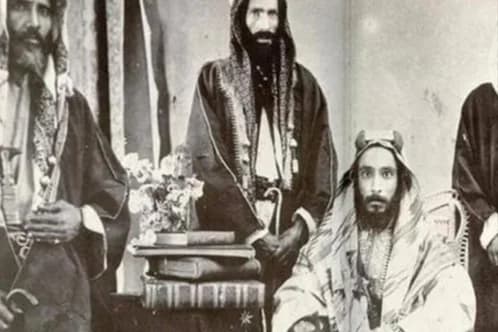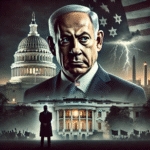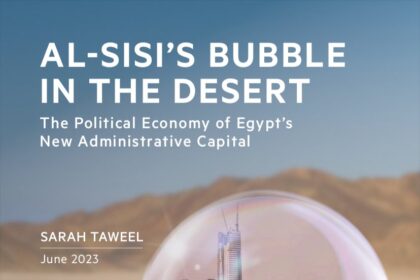Published on: May 14, 2019
مقالات ذات صلة:
Between politics and religion lies a long history of alliances and transformations in the Saudi kingdom, where the Wahhabi institution was reshaped to serve the state and adapt to political shifts. How did this institution play a role in bolstering state interests and contributing to pivotal regional and international changes?

In an era where our homes, lands, deserts, hills, and sacred sites have been seized, and where even our holy places have not been spared desecration and Judaization, the contempt has reached our most revered symbols, targeting the noblest of humanity, our Prophet Muhammad, peace be upon him. We have become the cheapest in blood and value, the lowest in stature and worth, and the most subjugated and submissive. We sold out people even before we sold stone, yet we have not learned our lesson. Conditions have worsened, the horizon has closed, and our fate remains uncertain. Our enemies (both our leaders and elite) worked hard against us, finding no better means than to undermine our religious institutions and politicize them according to their whims, supposedly to protect us from them, though, in truth, to safeguard their own thrones from us.
The Arab Spring came as a blooming season of freedom, exuding the fragrance of liberation and planting hope in every corner after a dark age filled with despair. Yet, this spring soon led to a miserable autumn; freedom was burned, hope was uprooted, and the heads of rebellious peoples became ripe for killing, slaughter, and abuse. This betrayal was led by religious scholars who had long preached the virtues of tolerance, justice, kindness, and forgiveness at times of power. They led religious institutions that ruled in the name of authority rather than faith, failing to be just, kind, or forgiving in power. Their banner became one of repression and justification for the ruler’s absolute brutality, even to the extent that some went as far as to exalt a misguiding tyrant and his interior minister as the likes of Moses and Aaron, rather than Pharaoh and Haman.
The modern religious institution has continued to oscillate between blatant security infiltration or blending with temporal authority since the nationalization of Islamic endowments in modern nation-states. Perhaps this unholy alliance—or call it the crafting of a religious institution through the appointment of scholars loyal to the ruler and silencing others either by intimidation or temptation—dates back to the founding of the first Saudi state when Muhammad ibn Abd al-Wahhab allied with Muhammad ibn Saud in 1744. This partnership sowed the seeds that would use religion as a political instrument, a tool that would adapt and shift according to the state’s interests.
The alliance between the two Muhammads was built upon a rejection and fight against innovations and polytheistic practices represented by the widespread tombs and shrines at that time in the Arabian Peninsula, advocating a return to pure and untainted Islam. However, this agreement was not purely a religious reform but rather a political pact cloaked under the legitimacy of religious reform. The agreement stipulated that Ibn Saud would protect Ibn Abd al-Wahhab in spreading his ideas, in exchange for granting religious legitimacy to Muhammad ibn Saud’s rule over the Arabian Peninsula. This covenant was strengthened by the marriage of Ibn Saud to Ibn Abd al-Wahhab’s daughter, solidifying this seed that continues to bear fruit to this day.
Two centuries after the spread of Wahhabism as a reformist movement in the Arabian Peninsula, following the fall of the first and second Saudi states, Abdulaziz ibn Saud, founder of the modern Saudi state, revived the old alliance between Wahhabism and the House of Saud through the ‘Ikhwan Man Ta‘ Allah’ (‘Brothers Who Obey God’). This alliance allowed him to project himself as a reforming Imam and provided a religious justification to rebel against the Ottoman Empire. To his followers, he was seen as the Imam and leader, rather than merely a king or sultan. Just as Ibn Saud unified the Peninsula after the end of the Najdi wars under the banner of religion and reformist thought, he eventually turned on his allies under that same banner.
The first signs of discord emerged between Abdulaziz and the Ikhwan, who held strict fundamentalist views and whom he had empowered as their leader and Imam. This discord surfaced when British interests clashed with the Ikhwan’s agenda to spread the call and combat what they saw as idolatrous practices, a central tenet of the Wahhabi movement. The Ikhwan requested Abdulaziz’s support to aid Muslims in Iraq after the British occupation, but Abdulaziz firmly rejected their request, bound by the Treaty of Bahra, an agreement with the British that required him to prevent raids along the Kuwaiti and Iraqi borders.
Abdulaziz realized that the Ikhwan’s role had come to an end, that their continued presence would spoil what he had achieved, and that it was time to confront them, a confrontation he had long postponed. Together with the scholars and judges he had gathered around him, Abdulaziz worked to discredit the Ikhwan, labeling them as misguided and extremist. The Riyadh Conference of 1927 was convened to unify Najd’s stance and mobilize them against the Ikhwan hardliners. The conference concluded with five principles, the last of which declared that the responsibility for jihad rested solely with the Imam, who had the authority to decide what was in the best interests of Islam and the Muslims. This clause marked a reversal of the alliance’s founding commitment to the call and jihad to spread the true religion and ensure God’s word was supreme. It led the Ikhwan to question Abdulaziz, asking, ‘How was jihad a legitimate duty when you were expanding your territories, yet became unacceptable when it conflicted with British interests and those of their allies?’ as noted by Jabran Shamia and Hafiz Wahba.
The Ikhwan eventually realized, though belatedly, the nature of Abdulaziz’s relationship with Britain. Some even went as far as to pronounce him an infidel for aligning with the Christian British and breaching the principle of loyalty and disavowal (al-wala’ wa al-bara’), a cornerstone of Wahhabi doctrine. They began circulating in the settlements that they were upholding the faith and implementing Sharia, which they believed Ibn Saud was on the brink of demolishing. They accused him of being a mere seeker of power, an ally of unbelievers, and complicit with them in all actions (Wahba, 1935).
Abdulaziz was able to defeat the Ikhwan with the help of his scholars and his British allies, successfully reshaping the Wahhabi institution to serve his interests, making it a cloak he could don or shed at will. He adopted Wahhabism’s most prominent feature: the practice of labeling others as misguided, deviant, or even infidel, by reviving the fight against shirk (polytheism), esoteric beliefs, and theological differences on God’s names and attributes—religious wars that had ended centuries before. Wahhabism presented itself as the sole legitimate heir to pure and untainted Islam, drawing its spatial legitimacy from controlling Islam’s two holiest sites, Mecca and Medina. As a result, Wahhabism succeeded in positioning its doctrines as the sole reference and legacy of Islam and the region, effectively overshadowing other authorities that had existed for thousands of years, such as Al-Azhar and Zitouna.
History repeated itself in the era of his son, King Fahd, under a new framework called the Sahwa (Awakening) movement. King Fahd exploited the Grand Mosque seizure by the Salafi Muhtasibah (the group later known as Juhayman’s followers) to strengthen a new sect that would become known as the Jamiyyah or Madkhalist Salafism. It took just eleven years for this doctrine to emerge, in circumstances strikingly similar to those surrounding the Ikhwan of ‘Brothers Who Obey God.’ When Saddam Hussein invaded Kuwait, falling into a trap that had been set, Wahhabism faced a new dilemma, requiring a fatwa to allow American forces to enter the Gulf, especially into Saudi Arabia itself. This decision struck at the very heart of Wahhabi ideology, directly challenging the doctrine of al-wala’ wa al-bara’ (loyalty and disavowal), where violating it constitutes one of the ten nullifiers of Islam. In his book Kitab al-Tawhid, Muhammad ibn Abd al-Wahhab deemed loyalty to non-Muslims against Muslims to be an outright act of disbelief, a clear breach of Islam’s fundamentals.
The Council of Senior Scholars did not only issue a fatwa permitting the entry of American forces into the holy lands of Saudi Arabia; they also adapted the Wahhabi doctrine to align with the kingdom’s policy of openness toward America and support for its regional presence. The Council went so far as to declare Saddam Hussein an infidel, thereby framing the collaboration as aiding in the fight against an unbeliever. This approach, considered debatable by Wahhabi scholars, places the decision in the hands of the ruler, weighing public benefit and harm. The religious institution, as Abdulaziz had once done, condemned, vilified, and discredited scholars who opposed the entry of American forces, even though they themselves were Wahhabis, closer to the Hanbali school from which Abd al-Wahhab derived his ideas. These dissenting scholars were imprisoned, and many were pressured to recant under the weight of incarceration and the jailers’ coercion.
This reveals that the struggle waged by the religious institution was not between extremism and moderation but rather an attempt to mold this school of thought to suit the will of the ruler and political authority. The reign of Muhammad bin Salman perhaps illustrates this concept even more clearly. He described this backwardness—his term—as encouraged by the West to support its fight against communism during the Cold War. According to his statements, Bin Salman seeks to restore Saudi Arabia to its former state before the Juhayman incident.














